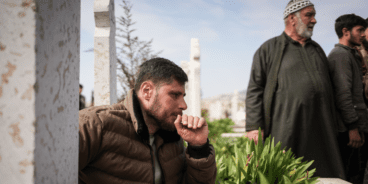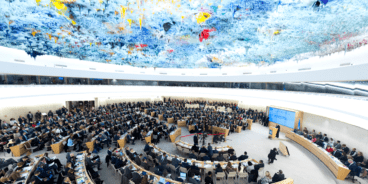
Beyond Chemical Weapons: What Next in Syria’s Sectarian Civil War?
The following Op-Ed by Dr. Simon Adams appeared in the Huffington Post on 30 October 2013.
No writer captured the horror of chemical warfare quite like the First World War soldier-poet Wilfred Owen. His depiction of a man drowning under “a green sea” of poison gas and of blood “gargling from the froth-corrupted lungs” is still haunting almost a century later.
Chemical weapons are inherently indiscriminate and immoral. They have been illegal since 1899, long before the first chlorine gas shell was fired over the Western Front. Despite the Hague Convention, an estimated 90,000 soldiers died from gas during WWI, with another million wounded, blinded or crippled. Following the war, the Geneva Protocol of 1925 reinforced the international prohibition of chemical weapons. Although Adolf Hitler, himself a survivor of a WWI gas attack, would use Zyklon-B as a tool of genocide in Auschwitz, poison gas was not widely deployed on a major battlefield again until the Iran-Iraq war of 1980-1988.
It is for this reason that the recent chemical weapons attack on Syrian civilians in the suburbs of Damascus was so shocking. The United Nations investigating team has shown beyond reasonable doubt that on 21 August rockets containing Sarin gas were deliberately fired into two residential areas. The gas quickly killed hundreds of civilians, including a large number of children. Despite the best efforts of the Syrian government to pin the blame on armed rebels, the evidence in the UN report pointed to the source of the rockets being the base of the 104th Brigade of the Republican Guard. Their culpability was compelling, if not undeniable.
Global revulsion at this war crime, combined with the credible threat of punitive air strikes by the United States and France, inadvertently led to a diplomatic breakthrough at the UN Security Council. After two-and-a-half years of deadlock, at the end of September the Council adopted Resolution 2118 supporting a Russia-United States deal for Syria to surrender its chemical weapons.
This is no meagre achievement. Just weeks beforehand the Syrian government was still vehemently denying it possessed chemical weapons. Now it has acceded to the 1997 Convention on the Prohibition of Chemical Weapons and will be held accountable under international law.
But as the backslapping at the UN abated, the awkward question of what to do about Syria returned. Syria has long since ceased to be a political conflict with sectarian undertones. It has become a full-blown sectarian civil war conducted with the participation of some secular combatants.
On one side are the government’s forces. President Bashar al-Assad is now more warlord than head of state. Within his besieged remnant of the country, the security establishment rules and Alawite and Christian militias are given license to massacre Sunni civilians suspected of sympathising with the rebels. The government still holds Damascus but as the recent polio outbreak reveals, it no longer governs in any comprehensive sense.
The opposition are faring considerably worse. Armed rebels are confronted by traumatised civilians, by a military balance of power which is tipping against them, and by deadly internecine feuds. During July extremist Islamist fighters carried out a mass execution of 51 captured soldiers at Khan al-Assal outside Aleppo. Other credible stories of war crimes committed against Christian and Shia civilians have eroded confidence in the ability of many armed opposition groups to liberate their people.
Syria is now effectively a patchwork of warring fiefdoms. An estimated 60% of Syrians still live in the government zone of control, but various armed rebels hold about 60% of the country’s territory. No one has sovereignty over Syria.
To arm or not to arm the Syrian rebels, that was the question being whispered in the corridors of power in Western democracies a few months ago. Now there is growing acceptance that more arms might only enable more atrocities and further destabilize the region. Lebanon, in particular, is in serious danger of becoming an extension of Syria’s sectarian battlefield. But things are not irredeemably bleak.
The compromise brokered by Russia and the United States over Syria’s chemical weapons – preceded by three vetos in the Security Council and the threat of military action outside of international law – is hugely significant. For the first time since April 2012 the Council has taken unanimous action regarding the conflict. The Security Council will not want to reprise its previous role of feeble spectator to a conflict that has already consumed over 100,000 lives.
There are three crucial issues that the Security Council must now resolve.
The first concerns humanitarian access. According to the UN, approximately five million Syrians are currently displaced inside the country in addition to the two million who have become refugees beyond Syria’s borders. For these Syrians the threat from dirty water or starvation is now as real as the risk of being shot or bombed to death. Unhindered cross-border access to both government and rebel-held areas is essential. The Council’s Presidential Statement of 2 October on this issue needs effective implementation.
The second priority should be for the Council to use its collective influence to help convene the Geneva II peace talks. Although a pacific outcome to the conflict seems fanciful at the moment, it is no more so than thinking that flooding Syria with arms and ammunition will secure an outright military victory for either side or stabilize the region. Countries that are backing Syrian rebel groups need to end support for those who commit war crimes and reject negotiations.
Finally, in the absence of accountability for mass atrocities perpetrated over the last two-and- a-half years in Syria there can be neither peace nor justice. Impunity emboldens those on both sides who are most resistant to a negotiated solution. The Council should immediately refer the Syrian situation to the International Criminal Court.
These issues are fraught with political hazard. But they are no more complicated than getting Russia to agree to a UN Security Council resolution that makes mention of Chapter VII (ie: use of force) consequences if Assad fails to surrender his poison gas and no more perilous than actually destroying Syria’s chemical stockpile while the country is in the midst of a civil war. For almost three years the Security Council has failed in its responsibility to protect the people of Syria. For better or worse, a diplomatic surge remains the only realistic hope to end the carnage.
Related Content


Atrocity Alert No. 430: Syria, Central African Republic and the Philippines
